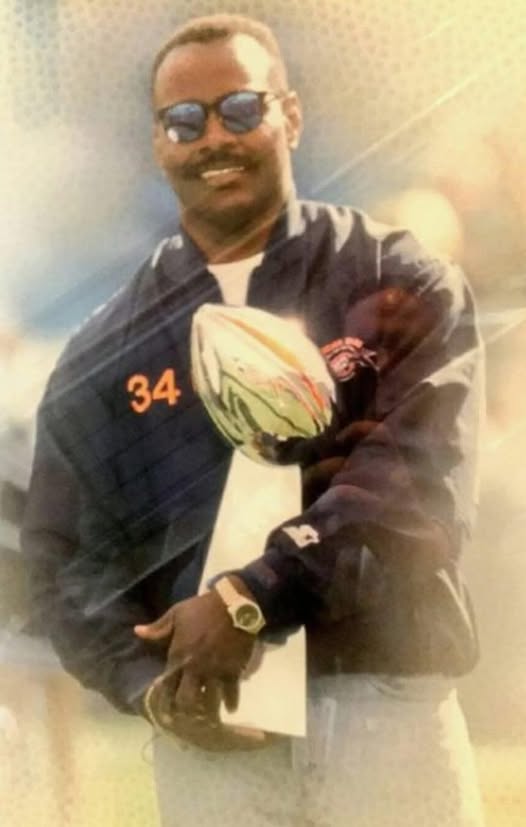Sweetness: Walter Payton – The Best to Ever Play the Game
In the storied history of the National Football League, few names stir reverence like Walter Payton. Nicknamed “Sweetness” for his smooth running style and ever-present smile, Payton’s legacy is more than statistics or highlight reels. He was a warrior in cleats, a gentleman off the field, and a symbol of determination, excellence, and character. For many—including legions of fans, teammates, and even opponents—he was, and remains, the greatest to ever play the game.
A Humble Beginning
Walter Jerry Payton was born on July 25, 1954, in Columbia, Mississippi—a place far removed from the bright lights of NFL stadiums. As a young man, he exhibited an uncanny athletic ability, excelling not only in football but also in track, baseball, and even the drums. His high school football career was modest at first—he didn’t even play until his junior year—but once he took the field, it was clear: he was special.
He went on to attend Jackson State University, a historically Black college, where he obliterated records and dazzled crowds with his elusiveness and drive. Over four seasons, Payton rushed for more than 3,500 yards and scored a staggering 66 touchdowns. His efforts earned him national attention, and in 1975, the Chicago Bears selected him with the fourth overall pick in the NFL Draft.
It would prove to be one of the most important decisions in football history.
Chicago’s Savior
The Bears were a franchise steeped in tradition but lost in mediocrity. Their last taste of glory had come in the 1960s, and by the mid-70s, they were desperate for a star. Enter Walter Payton.
His rookie year was a grind—just 679 yards rushing and a single touchdown—but it was the calm before the storm. Payton’s tireless work ethic became legendary. Teammates recalled seeing him run hill sprints after practice, even on game days. His training regimen was brutal, built on discipline and resilience, and it paid off in spades.
In 1977, Payton’s brilliance hit a new level. He rushed for 1,852 yards, scored 14 touchdowns, and averaged an astonishing 5.5 yards per carry. That year, he was named NFL MVP, and his performance against the Minnesota Vikings—where he ran for 275 yards despite having the flu—became the stuff of legend.
More Than a Runner
Payton was not a one-dimensional back. He was a superb blocker, a reliable receiver, and a surprisingly adept passer—he threw eight career touchdown passes, often catching defenses completely off guard. But what truly set him apart was his tenacity. Unlike other backs who shied away from contact, Payton welcomed it. He sought it. He ran with a combination of grace and violence, as if every carry was a chance to impose his will.
And impose he did.
His consistency was unmatched—10 straight 1,000-yard seasons, even behind some of the NFL’s most mediocre offensive lines. He took hit after hit, yet missed only one game in his entire 13-year career, and that was during his rookie season. He was the definition of durability and toughness.
The 1985 Season: The Ultimate Team Player
The 1985 Chicago Bears are one of the greatest teams in NFL history. A wrecking-ball defense, a swaggering coach, and yes—Walter Payton leading the offense. That team went 15-1, rolled through the playoffs, and obliterated the New England Patriots in Super Bowl XX, winning 46-10.
But the game left a bittersweet mark on Payton’s legacy.
Despite being the heart of the team, Walter Payton was not given the ball at the goal line during the game and did not score a touchdown. Coach Mike Ditka later said it was the biggest regret of his coaching career. Payton, ever the professional, did not complain, did not lash out. He was visibly hurt but handled the moment with dignity—because he had always been about the team, not himself.
Even in triumph, Payton taught the world what humility looked like.
Breaking Records, Setting Standards
On October 7, 1984, Walter Payton broke Jim Brown’s all-time rushing record of 12,312 yards. Brown, a legend in his own right, had been the gold standard, but Payton’s relentless pursuit of excellence took him beyond. He finished his career with:
- 16,726 rushing yards (an NFL record at the time)
- 110 rushing touchdowns
- 492 receptions
- 21,803 total yards from scrimmage
At the time of his retirement in 1987, he held virtually every major rushing record. His name was synonymous with greatness. He wasn’t just a football player; he was a cultural icon, a beloved figure who represented everything right with professional sports.
Sweetness Off the Field
Walter Payton’s nickname, “Sweetness,” wasn’t just about how he played—it was also about who he was.
He was deeply committed to community service, spending countless hours visiting children in hospitals, supporting charities, and engaging with fans. His playful, gentle nature made him a fan favorite across the league, even among rival teams. He was accessible, kind, and genuine—a far cry from the aloofness that often accompanies fame.
In 1993, the NFL created the Walter Payton Man of the Year Award, honoring players for their excellence on and off the field. To this day, it remains one of the league’s most prestigious honors—a fitting tribute to a man who lived a life of purpose and service.
A Battle with Dignity
In 1999, the world was stunned when Walter Payton announced he was suffering from primary sclerosing cholangitis, a rare liver disease. It was terminal.
Even in the face of death, Payton showed courage. He used his final months to raise awareness about organ donation and advocate for others in need. He appeared on television, visibly weakened but unshaken in spirit. His message was never about pity—it was about hope, helping others, and making every moment count.
On November 1, 1999, Walter Payton passed away at just 45 years old. The outpouring of love from across the sports world was immediate and overwhelming. He had touched so many lives, and his loss felt personal to millions.
Legacy Cemented in Greatness
Today, more than two decades after his death, Walter Payton’s legacy burns as brightly as ever. Statues, awards, fields, and schools bear his name. Every NFL season, fans see players don the Walter Payton Man of the Year patch with pride, knowing they’re representing a man who was so much more than a football player.
His son, Jarrett Payton, has worked tirelessly to preserve his father’s legacy, speaking on his behalf, hosting events, and continuing the mission of service that Walter championed.
And the stats? Many of them have been surpassed—but greatness is more than numbers.
Payton changed the position of running back. He inspired a generation of athletes to train harder, play tougher, and give more of themselves to the game and to the world. Legends like Emmitt Smith, Barry Sanders, LaDainian Tomlinson, and Adrian Peterson all point to Walter Payton as their idol, the gold standard.
Why Sweetness Was the Best
When fans debate the “GOAT” in football, quarterbacks like Brady and Montana often get the spotlight, and modern marvels like Mahomes steal headlines. But in the heart of every true football purist, there’s a reverence reserved for Sweetness.
Because Walter Payton played the game the right way.
He didn’t need trash talk. He didn’t seek endorsements. He didn’t chase clout. He chased excellence, every single down.
He was the rare athlete who could dominate between the lines and inspire far beyond them.
He ran over linebackers, spun past safeties, and still made time to sign autographs for kids who waited in the cold. He never let the game define him, yet he defined the game. He was elegance and grit, fire and grace. Sweetness, through and through.
Conclusion: More Than a Legend
Calling Walter Payton “the best to ever play the game” isn’t just a statement—it’s a belief rooted in truth. He was the heart of the Chicago Bears, the soul of a generation, and the embodiment of what football is meant to be: toughness, sacrifice, loyalty, and love.
Walter Payton never needed to declare his greatness. He just went out every Sunday and proved it, play after play, yard after yard, smile after smile.



